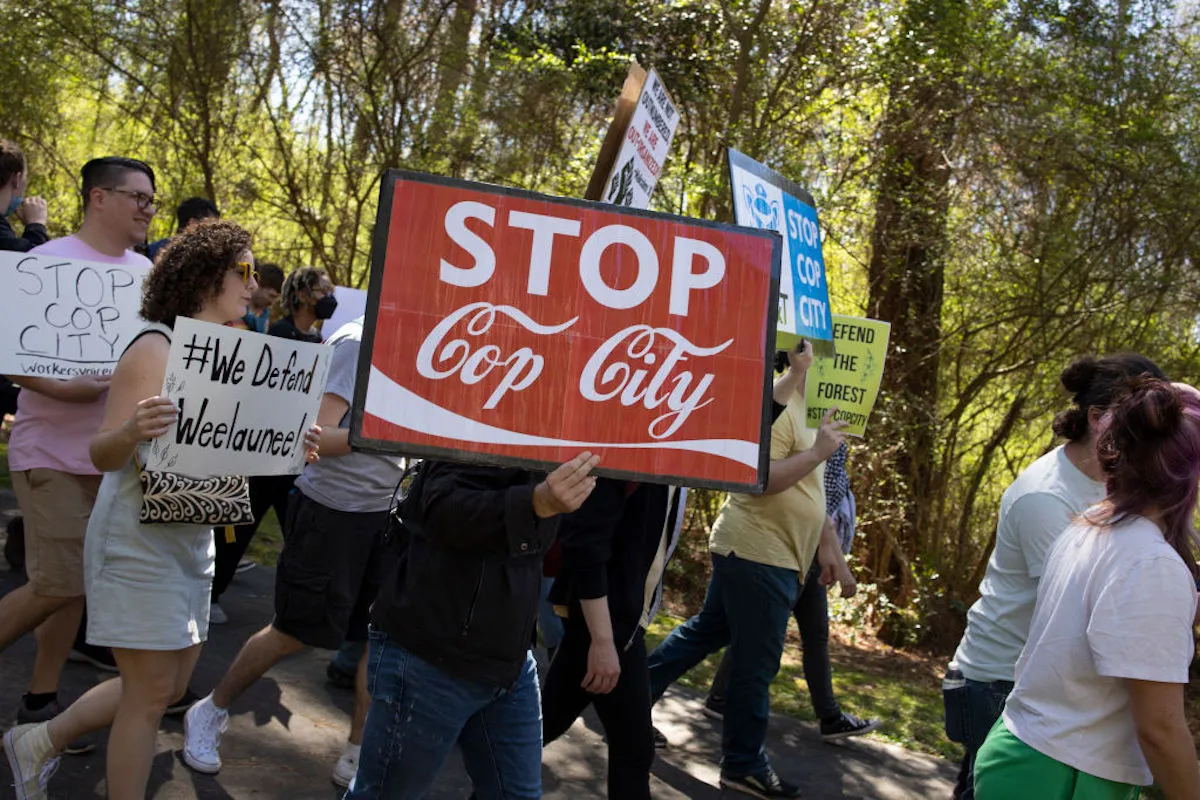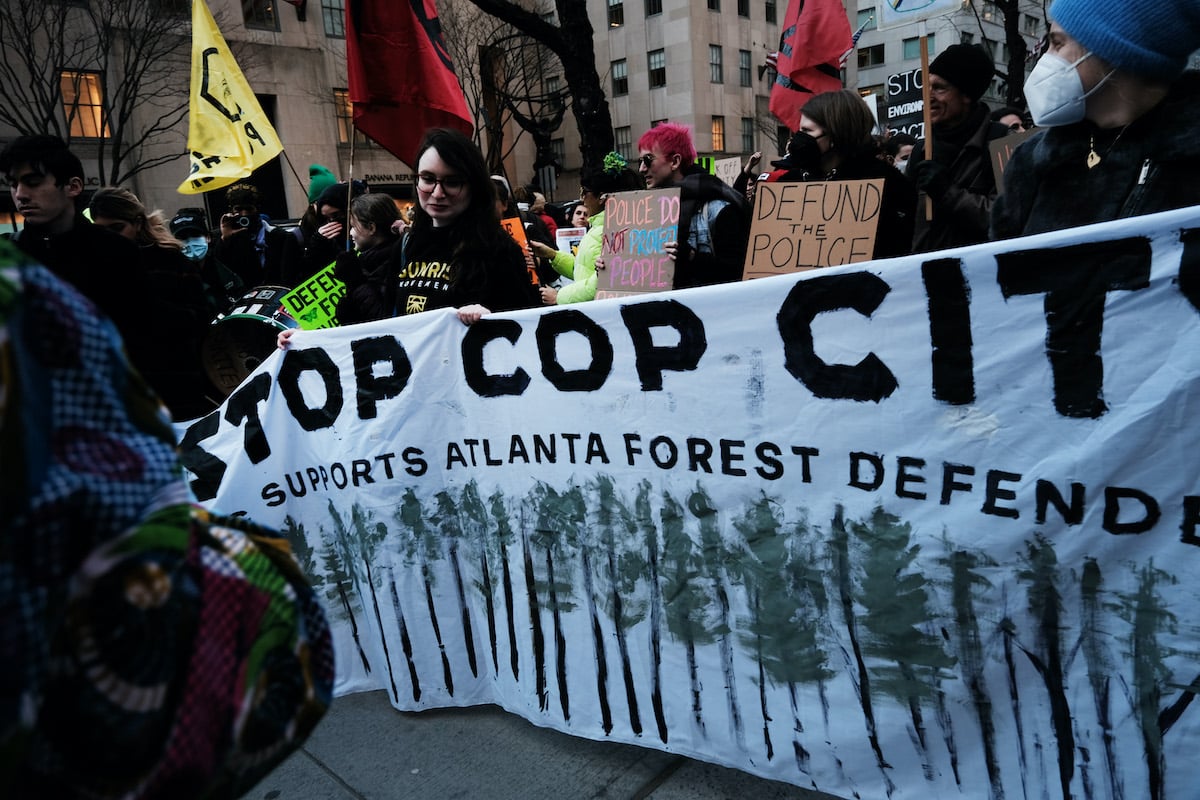‘Cop City’ is the police training ground being built in the South River Welaunee Forest. Despite massive public pushback and protests, including police’s fatal shooting of a protester, the project is still going forward and is currently estimated to cost about $90 million.
According to reporting by Capital B Atlanta, Atlanta’s former chief operating officer, Jon Keen, sent an email to the police foundation and city officials breaking down funding sources for the project as the following:
$30 million from philanthropic funding
$10 million in New Market Tax Credits (from the federal government)
$20 million loan taken out by APF that will be “repaid by a 20-year lease-back from the city at $1 million per year.”
$30 million infrastructure bond (from the city of Atlanta)
Using $60 million in taxpayer dollars to train cops in urban warfare is bad enough. But that $30 million from ‘philanthropic funding’ is also concerning. Who exactly is paying for Cop City (apart from taxpayers)?
Who is funding Cop City?
Part of the problem I am finding is that the exact donors to Cop City are hard to find and at times contradictory.
The American Friends Service Committee states that the Bank of America, Cadence Bank, The Coca-Cola Company, Cox Enterprises, Delta Air Lines, Gas South, Georgia-Pacific, The Home Depot, Inspire Brands, Republic National Distributing Company, and Truist News are all major corporate donors to the project. The AFSC also has lists of the contractors, sponsors, insurers, and other companies involved in the campaign.
Eyes on the Ties reports that Amazon, Axon, the Atlanta Hawks and State Farm Arena, Delta Airlines, Georgia State University, Home Depot, Inspire Brands, JP Morgan, UPS, Waffle House, and Wells Fargo all have high-ranking members who are on the board of directors for the Atlanta Police Foundation and are thus heavily involved in the planning for Cop City.
StopCopCity.net cites UPS, WellsFargo, GeorgiaPacific, and Truist News as being the main funders of the project; they even have prompts on their site, encouraging people who are against the development to tweet and email the corporations and ask them to withdraw support for Cop City. The Mary Sue reached out to some of these companies for comment and we’ll update if any response is given.
The Atlanta Police Foundation itself seems to be pulling in massive amounts of money from many of these corporations and more. Their 2022 Q3 donor list indicates that they received $46 million in donations last year, mostly from the following companies: The Woodruff Foundation, The James M. Cox Foundation Rollins, The J. Bulow Campbell Foundation, The Georgia Power Foundation, Invest Atlanta, The Goizueta Foundation, Brasfield & Gorrie, Tony Ressler, Chick-fil-A, UPS, The Coca-Cola Company, Fraser-Parker Foundation, Bank of America/Merrill Lynch, TULL Charitable Foundation, Georgia Pacific, Austin Stephens, Marcus Foundation, Gas South, Norfolk Southern, Jay Davis (National Distributing Company), Brent Scarborough Co. Inc., Courts Foundation (Anonymous), and Zeist.
Why is this a problem?

Some people may ask why it would be a problem for corporations to make donations to police, dismissing it as simply a way of “giving back to the community.”
However, this ignores a plethora of problems.
First, corporate donations are frequently used as a tax write-off, meaning money that could have gone to supporting infrastructure or education or welfare is instead funneled directly to the police.
Furthermore, corporate donations can easily turn into a form of bribery, or at the very least, muddy the ethical waters. Eyes on the Ties noted that “In 2011, JPMorgan gave the New York City Police Foundation $4.6 million, turning the NYPD into a militarized presence during Occupy Wall Street.” Large corporate donations to the training of police officers could incentivize the police to prioritize those companies and not the communities they serve.
There’s also the issue of corporate funding incentivizing the city to continue with the project despite the public backlash. Environmentalists, police reformers, and young people in Atlanta are almost all in agreement about how the negative impact of the project outweighs any perceived benefits.
These corporate donations are also hypocritical to the nth degree. Many of these companies loudly insisted they support Black communities and decried police actions leading to the death of George Floyd, yet many of them continue to funnel money into police foundations that disproportionately target Black Americans. Georgia State University’s continued involvement with the Georgia International Law Enforcement Exchange (GILEE), is especially concerning. Despite 150 faculty members sending an open letter asking the university to cut ties with the organization, the University and the GILEE are still reportedly working together.
All of this has real, long-term implications and effects on not just Atlanta, but on the relationships between corporations and police across the country.
(featured image: Spencer Platt/Getty Images)










Published: Oct 23, 2023 04:25 pm